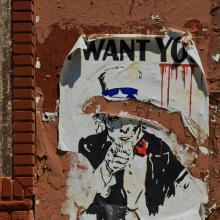An eyewitness to massacre and genocide finds shame, hope, and possibility for a moral world.
Feature
Asserting that "it takes two to tango," the Jubilee movement argues that it is high time lenders assume their share of responsibility for the debt crisis.
The Jubilee movement works to free the world's poorest countries from debt.
Corruption is a problem in Kenya and many countries. Where corruption is intractable, trust funds can be used to ensure that money freed by debt cancellation is used to benefit the poor.
Through the Jubilee USA Congregations program, faith communities across the U.S.
In a land of asphalt, malls, and picket fences, how do we serve God and neighbor?

Craig Wactor / Shutterstock
RECENTLY I STUMBLED upon an online exchange about why young people join the military. One participant who claimed to be "on the Left" made the following assertion: "Disenfranchisement is the reason why kids join the military and they know going in that it gives them the opportunity to legally and with the blessing of our government kill, torture, and hate other people in order to give an outlet to their hostilities toward society."
Among the many youth I have met over the years as an educator and counter-recruitment activist, I have never met anyone who enlisted so that he or she could "kill, torture, and hate." While "disenfranchisement" may be an accurate word for why some youth enlist, the claim that working-class youth sign up so that they can "legally kill and torture other people" at the very least betrays a profound misunderstanding of why young people join the "all-volunteer military" and at worst reveals biases that separate Americans due to differences of class and race.
On the opposite end of the political spectrum, the conservative claim that most youth enlist due to patriotism and the desire to "serve one's country" is equally misleading. The Pentagon's own surveys show that something vague and abstract called "duty to country" motivates only a portion of enlistees. But the vast majority of young people wind up in the military for different reasons, ranging from economic pressure to the desire to escape a dead-end situation at home to the promise of citizenship.
WHEN MANDATORY MILITARY service ended in 1973, the volunteer military was born. By the early 1980s, the term "poverty draft" had gained currency to connote the belief that the enlisted ranks of the military were made up of young people with limited economic opportunities.
Today, military recruiters react angrily to the term "poverty draft." They parse terms in order to argue that "the poor" are not good recruiting material because they lack the necessary education. Any inference that those currently serving do so because they have few other options is met with a sharp rebuke, as Sen. John Kerry learned last November when he seemed to tell a group of college students they could either work hard in school or "get stuck in Iraq."
President Bush led the bipartisan charge against Kerry: "The men and women who serve in our all-volunteer armed forces are plenty smart and are serving because they are patriots—and Sen. Kerry owes them an apology."
In reality, Kerry's "botched joke"—Kerry said he was talking about President Bush and not the troops—contained a kernel of truth. It is not so much that one either studies hard or winds up in Iraq but rather that many U.S. troops enlist because access to higher education is closed off to them. Although they may be "plenty smart," financial hardship drives many to view the military's promise of money for college as their only hope to study beyond high school.
• Write your members of Congress to demand that they not renew the president's "fast track" authority on trade agreements, which ties Congress's hands by allowing it only to approv
1) As a citizen:
Join the trade justice movement
Go to the "get involved" or "take action" links on the following Web sites:
- U.S.
How Britain's Traidcraft went from church hall to the London Stock Exchange, without losing the faith.
Understanding the perils and promise of international trade. Includes Web Exclusive: List of additional readings and resources.







